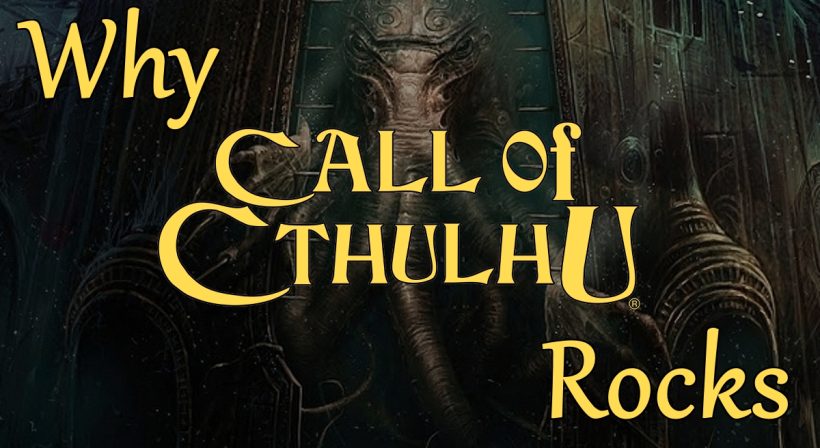Hey there, fellow tabletop enthusiasts! If you’re anything like me, you’ve probably spent countless hours rolling dice, slaying dragons, and saving kingdoms in the wonderful world of Dungeons & Dragons 5th Edition (D&D 5e). It’s a fantastic game with a rich history and a massive fan base. But, have you ever considered stepping into the eerie, mysterious, and downright terrifying world of Call of Cthulhu (CoC)? If not, buckle up, because we’re about to explore why Call of Cthulhu might just be the better game for you.
The Atmosphere: Dread vs. Heroism
First things first, let’s talk about the atmosphere. D&D 5e is all about high-fantasy adventure. You get to play as powerful heroes, cast incredible spells, and face off against epic monsters. It’s like stepping into your favorite fantasy novel or movie, and it’s awesome. Who doesn’t love being a dragon-slaying hero?
But Call of Cthulhu takes a different approach. Instead of being the hero, you’re an ordinary person thrown into extraordinary and often horrifying situations. Inspired by the works of H.P. Lovecraft, CoC is steeped in cosmic horror. The emphasis is on mystery, investigation, and the sheer dread of facing the unknown. Imagine playing a detective in a noir film, unraveling a dark conspiracy, or an archaeologist stumbling upon an ancient, cursed artifact. The atmosphere is thick with tension and fear, making every discovery and every encounter with the unknown feel significant and spine-chilling.
Realism and Consequences: High Stakes, High Rewards
In D&D 5e, you’re often on a power trip. Your characters start off strong and only get stronger. You can take a hit from a dragon and still swing your sword. It’s exhilarating, but it can sometimes make the game feel a bit… safe. Your characters are heroes, after all. They’re expected to survive, triumph, and become legends.
Call of Cthulhu, on the other hand, doesn’t pull any punches. Your characters are regular folks—academics, journalists, detectives—people who aren’t used to fighting monsters. Combat is dangerous, and running away is often the best option. And then there’s the sanity mechanic. Encountering eldritch horrors can drive your character mad, and managing your mental state becomes as crucial as solving the mystery. This focus on realism and consequence makes every decision, every encounter, and every clue feel vital. The stakes are higher, and so is the emotional payoff when you manage to survive or solve the mystery.
Character Development: Depth Over Power
Creating a character in D&D 5e is like picking your favorite superhero. Do you want to be a mighty barbarian, a cunning rogue, or a wise wizard? Your character’s class, race, and abilities define what they can do, and as you level up, you get to unlock even more awesome powers. It’s a blast, and it’s easy to get attached to your character’s journey from rookie adventurer to legendary hero.
Call of Cthulhu, however, emphasizes a different kind of character development. Since your characters are regular people, their backgrounds, skills, and personal histories play a huge role in the game. The game encourages you to create deep, multi-faceted characters whose personal lives and experiences are just as important as their ability to handle a shotgun. And because the game is so lethal, every character arc is precious. Watching your character grow, face their fears, and maybe even lose their sanity provides a deeply satisfying and often poignant experience.
The Keeper’s Challenge: A Storyteller’s Dream
If you’ve ever been a Dungeon Master (DM) in D&D 5e, you know it’s a mix of storytelling, world-building, and refereeing combat. It’s a rewarding job, but it can also be a bit of a juggling act, especially when combat-heavy sessions dominate the gameplay.
In Call of Cthulhu, the Game Master (known as the Keeper) takes on a role more akin to a director in a horror movie. The Keeper crafts intricate plots filled with suspense, mystery, and a constant sense of dread. You’re guiding the players through a narrative that prioritizes atmosphere and psychological tension over combat. It’s a fantastic challenge for those who love weaving complex stories and creating memorable experiences. If you’re a storyteller at heart, being a Keeper in Call of Cthulhu can be incredibly fulfilling.
A World of Variety: More Than Just Tentacles
Sure, Call of Cthulhu is known for its Lovecraftian horror, but the game is surprisingly versatile. You can set your campaigns in the 1920s, modern-day, or even the distant future. Each setting offers unique opportunities for storytelling. Imagine solving a mystery in the roaring twenties, complete with flappers and speakeasies, or investigating a haunting in a high-tech sci-fi world. The flexibility of CoC allows you to explore different genres and styles of play, all while maintaining that core sense of mystery and dread.
D&D 5e, while versatile in its own right, is firmly rooted in the high-fantasy genre. You’ve got your medieval kingdoms, your dragons, your magic spells—it’s a fantastic setting, but it does have its thematic limits. Even when you adapt it to other settings, the core mechanics are designed for fantasy adventure. If you’re craving something different, Call of Cthulhu offers a refreshing change of pace.
The Social Experience: Collaboration Over Combat
One of the best parts of any RPG is the social experience—working together with your friends to overcome challenges and tell a great story. In D&D 5e, this often means strategizing for battles, planning your next dungeon crawl, and figuring out how to use your abilities to their fullest potential. It’s a cooperative game, but the focus is frequently on how to be the most effective in combat.
Call of Cthulhu shifts the focus to collaboration and investigation. You and your fellow players need to pool your skills and knowledge to solve mysteries and survive. It’s less about who can do the most damage and more about who can find the crucial clue, interpret the ancient text, or keep their cool when things go south. This fosters a different kind of camaraderie, one that emphasizes teamwork and shared problem-solving over individual heroics.
Personal Investment: Stakes and Stories
Let’s talk about emotional investment. In D&D 5e, it’s easy to get attached to your character as they grow stronger, acquire powerful gear, and accomplish heroic deeds. You feel proud of their achievements and excited to see where their journey takes them next.
Call of Cthulhu, though, takes emotional investment to another level. The game’s high stakes—where death and madness are always lurking—mean that you’re constantly on edge, deeply invested in your character’s survival and sanity. When your character unravels a mystery or survives a harrowing encounter, the victory feels immensely rewarding. And if your character succumbs to the horrors they face, it’s a poignant moment that can leave a lasting impact on the entire group.
The Learning Curve: Depth Over Simplicity
D&D 5e is known for being relatively accessible, especially compared to earlier editions. The rules are streamlined, and it’s easy for new players to jump in and start having fun. This accessibility is one of the reasons for its massive popularity.
Call of Cthulhu has a bit more of a learning curve. The mechanics are different, and the focus on investigation and psychological horror can be a shift for players used to D&D’s combat-heavy style. However, this complexity also brings depth. The detailed character creation, the sanity mechanics, and the emphasis on storytelling create a rich, immersive experience. It might take a bit more effort to learn, but the payoff is a deeply rewarding game that offers something truly unique.
Conclusion: Two Great Games, Two Different Experiences
At the end of the day, both Dungeons & Dragons 5e and Call of Cthulhu are incredible games that offer their own unique experiences. D&D 5e is perfect if you’re looking for high-fantasy adventure, epic battles, and the thrill of becoming a legendary hero. It’s accessible, fun, and has a vast world to explore.
But if you’re craving something different—something darker, more immersive, and psychologically intense—then Call of Cthulhu might just be the game for you. Its emphasis on atmosphere, realism, and nuanced storytelling provides a captivating and often chilling experience. For players and Keepers who love a good mystery, a bit of horror, and the thrill of the unknown, Call of Cthulhu offers a rich, rewarding alternative to the high-fantasy heroics of D&D 5e.
So why not give it a try? Gather your friends, light some candles, and prepare to dive into the unknown. Just remember to keep your wits about you—because in the world of Call of Cthulhu, madness is always just a dice roll away.

